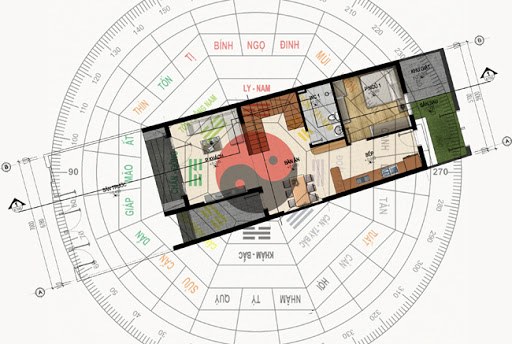Have you ever wondered how the orientation of your home can impact your energy and well-being? In Feng Shui, the direction a house faces is just one of many factors that contribute to its overall energy, and a north-facing house can bring unique benefits and challenges.
At Lotusbuddhas.com, we are dedicated to helping you understand the meaning of a north-facing house in Feng Shui and how you can enhance its positive energy to improve your overall quality of life.
Whether you’re new to Feng Shui or an experienced practitioner, this guide will provide valuable insights and practical tips to help you activate the energy of your north-facing home and create a harmonious living space. So, let’s dive in and discover the secrets of a north-facing house in Feng Shui!
How to Determine Your House Facing Direction
Determining the facing direction of your house is a crucial step in applying the principles of Feng Shui. It serves as the foundation upon which other aspects of this ancient art will be implemented. As the compass guides a traveler, knowing your home’s facing direction helps to map out the energy blueprint and ascertain how the chi, or life force, flows within your dwelling.
To identify your house’s facing direction accurately, follow these systematic steps imbued with the wisdom of Feng Shui:
- Identify the Facing Side of Your House: In Feng Shui, the ‘facing’ of the house is typically the side that has more yang energy – more activity, is more exposed, or has more windows and doors. This is often the side facing the street, but not always. If you live in a flat, the front door usually determines the facing direction.
- Use a Reliable Compass: Obtain a Luo Pan, a Chinese compass specifically designed for Feng Shui, or any other precise and high-quality compass. The accuracy of the compass is essential to determine the correct facing direction.
- Stand at the Facing Side: Stand at your front door or the identified facing side of your house, looking outwards. Make sure no metal objects are nearby as they may interfere with the compass reading.
- Take the Compass Reading: Hold the compass level, with the direction of travel arrow pointing straight ahead, away from the house. Make sure your body, especially your hands and any electronic devices, do not interfere with the compass needle.
- Record the Reading: Look down on the compass and record the degree marking where the direction of travel arrow intersects the compass dial. This is your house facing direction.
Your house’s facing direction is given in degrees, and these degrees are further classified into the eight cardinal and intercardinal directions – North, South, East, West, Northeast, Southeast, Northwest, and Southwest. Each of these directions carries different energetic qualities and attributes within the Feng Shui context.
As the majestic sun rises and sets, painting vivid hues in the sky, different parts of the day and different seasons carry diverse energies. Similarly, your home, based on its facing direction, harbors a unique chi profile that is waiting to be harmonized with the living entities within.
Meaning of North-Facing House in Feng Shui
In the divine and ancient art of Feng Shui, the orientation of a house plays a vital role in manifesting the energy flow, known as Chi, within the living space. A north-facing house, specifically, holds immense significance and unique attributes when seen through the insightful lens of Feng Shui.
In the Bagua, the Feng Shui energy map of a home, the north compass sector aligns with the Water element and is tied to the life areas of Career and Life Path. This domain connects to personal growth, unfolding wisdom, and the natural evolution of life’s journey.
A North-facing house, therefore, symbolizes a journey of exploration, discovery, and self-realization. It is an embodiment of a stream flowing effortlessly towards its destination, nurturing everything in its path, mirroring the quality of a thriving career and unimpeded life progression. This direction is also associated with the tranquil and mysterious energy of the night, leading to introspection, renewal, and profound wisdom.
The essential water element represents fluidity, transformation, and adaptation. When a house faces North, it is imbued with the dynamic energy of water, creating an environment of flexibility and continual evolution, fostering the inhabitants’ ability to adapt to changes and flow with life’s natural rhythm.
However, it’s vital to bear in mind that Feng Shui is an intricate art, and one size does not fit all. Individual circumstances, birth elements, and personal Kua numbers also need consideration. While these general attributes of a North-facing house provide a broad understanding, a personalized consultation with a Feng Shui expert would provide the most effective solutions and enhancements tailored to your unique energy blueprint.
Harnessing the energies of a North-facing house can open doors to spiritual growth, career progression, and a life path flowing with ease, just like a serene, yet powerful river flows towards the infinite ocean, adapting, and enriching its course.
Advantages of North-Facing House
A North-facing house possesses distinctive energetic qualities that, when harmonized effectively, can impart a range of benefits to its inhabitants. To delve into the auspicious advantages of a North-facing house, we must first understand its energetic signature in the context of Feng Shui. Aligned with the Water element, the North is linked to the life areas of Career and Life Path, embodying the metaphor of a river flowing towards its destiny.
- Career and Life Path Enhancement: As the North sector resonates with the career and life path, those residing in a North-facing house may find it conducive to professional development and career progression. The dwelling becomes a cradle for nurturing ambitions and fostering a clearer understanding of one’s life purpose.
- Adaptability and Flexibility: The water element symbolizes fluidity and adaptability. A North-facing house thus encourages the ability to flow with life’s changes, to adapt, transform, and evolve, much like water shaping its course as per the terrain.
- Wisdom and Introspection: Associated with the mysterious energy of the night, a North-facing home can inspire introspection and the cultivation of deeper wisdom. It’s an ideal space for reflection and intellectual growth, stimulating insight into life’s mysteries.
- Emotional Health and Well-being: The gentle and calming energy of the water element can help in managing stress and fostering emotional well-being. A North-facing house could serve as a peaceful sanctuary, aiding in the cultivation of inner peace and tranquility.
- Fertility and Creativity: According to some interpretations, water is also associated with creation and fertility. Hence, a North-facing house can encourage creativity, innovative thinking, and may support starting a family or expanding existing ones.
In addition to the Feng Shui advantages, a North-facing house also has objective advantages in terms of its location. Here are some of the advantages of having a north-facing house:
- Bright Natural Light: North-facing homes receive ample natural light throughout the day, making them bright and cheerful. This can improve your mood, reduce stress, and help you save on energy costs.
- Cooler in Summer: As the sun rises in the east and sets in the west, a north-facing house remains cool and shady in the hot summer months. This can help you save on air conditioning costs and create a more comfortable living environment.
- Good for Plant Growth: North-facing homes are ideal for growing plants, as they receive consistent natural light. This can create a lush, green environment and improve the air quality in your home.
- Better for Sleeping: North-facing homes are ideal for sleeping as they are less exposed to the morning sun, allowing you to sleep later and enjoy more restful sleep.
Remember, the house’s orientation is just one aspect of Feng Shui. Each dwelling is unique, with its energetic imprint, and while a North-facing house carries these general attributes, the layout, the inhabitants’ personal energies, and the external environment also play a significant role.
Disadvantages of North-Facing House
A North-facing house, despite its many virtues, may present certain challenges when the inherent Water element and related energies are not well-balanced or harmonized.
The North sector, associated with the Career and Life Path and represented by the Water element, can indeed present a fluid and adaptive environment. However, without careful Feng Shui consideration, the same characteristics can potentially introduce instability or a sense of drifting without clear direction.
- Potential for Instability: The flowing, ever-changing nature of water may, at times, translate into feelings of instability or lack of grounding in a North-facing house. Occupants might experience difficulty maintaining consistent progress or holding firm to their decisions, mirroring water’s inherent unpredictability.
- Overwhelm and Stress: Water’s relentless movement can sometimes manifest as a sense of overwhelm or even increased stress, particularly in career and life path aspects. The pressure to constantly adapt and evolve might become taxing if not effectively balanced.
- Cold and Damp Conditions: In practical terms, North-facing homes in certain geographic locations might get less sunlight, leading to colder and potentially damp conditions. This could influence the comfort level and even health of the inhabitants if not well-managed.
- Suppressed Fire Element: In the cycle of the Five Elements in Feng Shui, Water suppresses Fire. If not balanced appropriately, this can potentially dampen the energy associated with Fire, such as passion, recognition, and fame.
- Emotional Overwhelm: The emotional aspect connected with Water might lead to a tendency for occupants to become overly emotional or introspective, potentially clouding rational thinking and decision making.
You must to remember, however, that these potential disadvantages do not signify a North-facing home is a poor choice. Rather, they serve as guidelines for areas requiring additional attention when applying Feng Shui principles.
In addition to the Feng Shui disadvantages, a North-facing house also has objective disadvantages in terms of its location.
- Colder in Winter: As north-facing homes receive less direct sunlight, they can become colder in the winter months. This may require the use of additional heating to keep the home comfortable.
- Shorter Garden Season: North-facing gardens receive less direct sunlight, which can limit the types of plants that can grow there and reduce the length of the growing season.
- Less Privacy: North-facing homes are often more exposed to neighbors and passing traffic, which can be a disadvantage for those seeking privacy and quiet.
- Limited Solar Exposure: North-facing homes receive limited direct sunlight, which can reduce the potential for solar power generation and limit the use of outdoor living spaces.
Working with a Feng Shui expert can provide more personalized guidance, taking into account the unique energy blueprint of your home and its occupants. In the harmonious dance of Feng Shui, every challenge is merely an opportunity for greater balance and prosperity. With knowledge, mindfulness, and balanced application, a North-facing house can become a haven of growth, tranquility, and flourishing success.
How to Create Good Feng Shui for North-Facing House
Creating a harmonious atmosphere in a North-facing house in Feng Shui involves understanding the energy profile of this direction, its inherent strengths, and challenges, and applying remedial measures and enhancements accordingly. As the North aligns with the Water element and influences the Career and Life Path aspect, the application of Feng Shui principles should focus on enhancing these energies and establishing an overall balanced environment.
Here are some practical ways to create good Feng Shui in a North-facing house:
- Promote Water Element: Emphasize the water element with actual water features such as aquariums, fountains, or images of water in your decor. Ensure the water is always clean and moving, symbolizing an active and prosperous life path.
- Incorporate Suitable Colors: Use colors that correspond to the Water element, such as blues and black, to bring about a sense of calm, depth, and tranquility in your home. You can also use metallic colors like white, silver, or gray, which belong to the Metal element, the mother element of Water, to enhance its properties.
- Use Metal Element: Metal produces Water in the productive cycle of the Five Elements, so incorporate metal items into your decor. This could be through metallic finishes on furniture, metallic artwork, or other metal accessories.
- Balance with Other Elements: While emphasizing the Water and Metal elements, also consider integrating the other elements to ensure balance. Include the Fire element to invite recognition and warmth, the Earth element for stability, and the Wood element for growth and vitality.
- Choose Appropriate Shapes: Fluid and asymmetrical shapes resonate with the Water element, while round or oval shapes represent Metal. These can be incorporated in the furniture, artwork, or other decor elements.
- Lighting and Space: As North-facing homes can sometimes lack sunlight, it’s essential to ensure adequate lighting. Allow as much natural light as possible and complement it with warm artificial lighting. Open, clutter-free spaces encourage the smooth flow of chi and prevent stagnation.
- Maintain a Flowing Layout: Ensure a free-flowing, non-restrictive layout in the house that mimics the flowing nature of water, enhancing the movement of positive chi throughout your home.
- Use Mirrors: Mirrors represent the Water element. Placing them strategically can stimulate the flow of positive energy and make the space feel more expansive and open.
Remember, Feng Shui is highly personalized. These general guidelines can indeed create good Feng Shui for a North-facing house. However, the best results can be achieved by considering individual circumstances, the overall home layout, external surroundings, and the personal Kua numbers of the residents. Consulting a Feng Shui expert can provide more tailored solutions and ensure the creation of a vibrant, harmonious, and prosperous living environment that taps into the best potential of your North-facing home.










